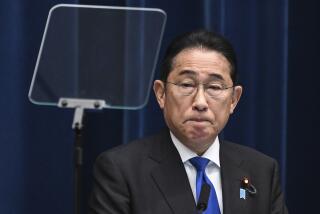JAPAN : A Hard Slap in the Face for Kaifu : The prime minister’s party changes its attitude, and this could cost him his job.
- Share via
TOKYO — Prime Minister Toshiki Kaifu has suffered the first visible blow to his chances of retaining power when he stands for reelection as president of the ruling Liberal Democratic Party in October.
Without informing him in advance, party officials have, in effect, declared an end to their worries about the 1989 stocks-for-favors Recruit scandal. They also have freed Kaifu’s most serious rivals from two years of scandal-tainted penitence in the political shadows.
The action took place Friday when the party’s Discipline Committee and the General Affairs Board restored party membership to Yasuhiro Nakasone, 72, the scandal-tainted former prime minister.
“What? Where was that decided?” Kaifu said to reporters who asked him Thursday night about the impending move.
Kaifu, 60, who is prime minister by virtue of his party post, lacks a personal political following and has been faulted for blunders and weak leadership. But he has retained power with the support of the 113-member Liberal Democratic faction led by former Prime Minister Noboru Takeshita.
The Recruit cloud that had hung over all of his would-be rivals also served to put a lid on ruling party machinations.
With that gone, the path appeared open for former Finance Minister Kiichi Miyazawa, 71, and former International Trade and Industry Minister Michio Watanabe, 67, to challenge Kaifu in the October election for the party leadership. Takeshita, 67, who gave advance approval to Nakasone’s restoration, also is reportedly eyeing a comeback as prime minister.
(Nakasone’s age is regarded as a handicap to any ambitions for another term as prime minister. Another would-be challenger, former Foreign Minister Shintaro Abe, 66, has been eliminated from contention by illness.)
Takeshita was forced to resign in May, 1989, in the wake of disclosures that he had received $1.5 million in favors from Recruit Co., an information and real estate conglomerate. Nakasone left the party later the same month to assume “moral responsibility” for the scandal.
Takeshita, Miyazawa and Watanabe have been denied posts of leadership in both the party and the government but have kept their party membership.
Although neither Nakasone nor the other tainted kingpins were accused of violating any law, three people have been convicted and nine others are standing trial on charges of Recruit Co. bribery occurring during Nakasone’s 1982-1987 term.
The party decision amounted to a slap in the face for Kaifu, who rejected demands that he appoint Recruit-tainted politicians to each of the three cabinets he has formed. Kaifu’s stand against corruption has been the only issue on which he has visibly exerted personal leadership.
Nakasone celebrated his comeback by traveling Friday to a naval base at Yokosuka to help send off the first Japanese military forces dispatched overseas since the end of World War II. “I am happy with this action,” he said as three of the six ships in a minesweeper convoy left for the Persian Gulf. “This is our human contribution to the Gulf effort. It is the proper thing to do.”
As prime minister, Nakasone had tried to send minesweepers to the Persian Gulf during the Iran-Iraq War but demurred in the face of opposition in his own party.
Political analysts said significant Liberal Democrat gains and a major setback for the No. 1 opposition party, the Socialists, in local elections this month convinced the ruling party that it no longer has to worry about repercussions from the Recruit scandal.
More to Read
Sign up for Essential California
The most important California stories and recommendations in your inbox every morning.
You may occasionally receive promotional content from the Los Angeles Times.













